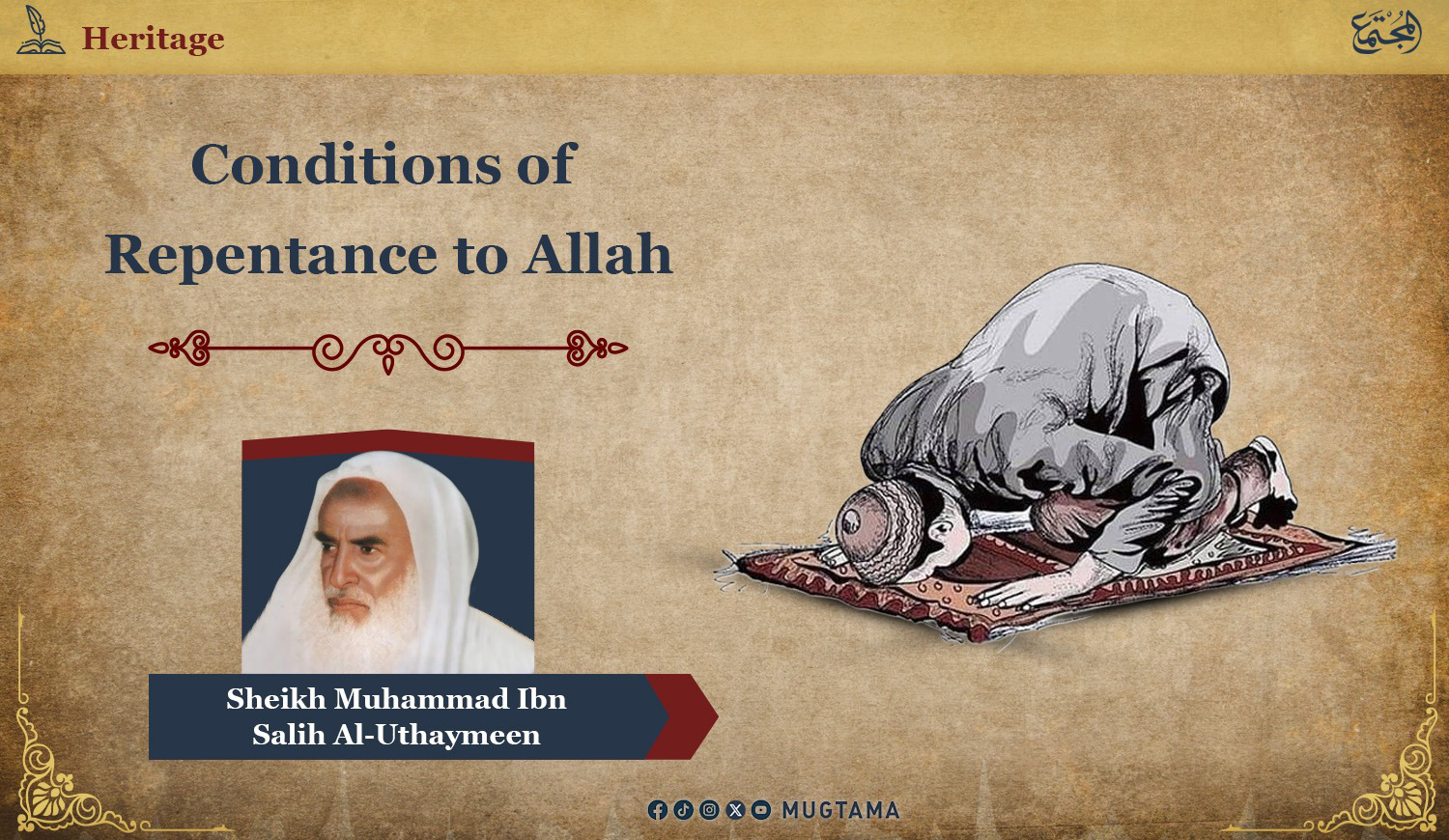Conditions of Repentance to Allah

The Conditions of Repentance to Allah
1-
Sincerity to Allah
That the servant is sincere in
his repentance, abandoning the sin because it is a sin and disobedience to
Allah, not because people see him, but out of fear of the punishment of Allah.
He performs the obligation not because people see him and praise him, but
because it is pleasing to Allah. Sincerity to Allah, the Almighty, is the most
important pillar and condition of repentance.
If a person repents out of fear
of the ruler, is his repentance valid? No. Allah Says, {Turn
to Allah in sincere repentance.} [At-Tahrim 66:8] That is, repent to Allah, not to anyone else. May Allah, grant us sincerity.
2- Remorse
That he regrets what he has done
of sins. He must
submit and feel ashamed before Allah, the Almighty, and fearful of Him. He
should say in sorrow: “If only I had not done it.” But he must also abandon the
sin. Remorse is essential, but repentance is not valid if a person feels that
committing the sin or not committing it is the same.
Remorse must be as if the person has
lost something beloved to them, or as being afflicted with something they hate.
They must feel true remorse for the sin that has passed.
3- Abandoning the Sin Immediately
That he abandons the sin. If it
is an act of disobedience, he must avoid it. If it is neglect of an obligation,
he must perform it.
For example: A man learns that
backbiting is forbidden. Backbiting is
mentioning people’s faults and attributing to them what they hate. He learns
that this is forbidden and one of the major sins, as stated by Imam Ahmad Ibn Hanbal (may Allah have mercy on him). He resolves to
repent and regrets what he did, but whenever an opportunity arises, he still
backbites people. Would you say his repentance is valid? No. He must abandon it
immediately.
Another example: A man neglects
congregational prayer even though he is able to attend it, and he claims to
repent. Yet he continues to abandon congregational prayer. Would you say his
repentance is valid? No. Why? Because he did not abandon the sin. He insists on
not praying. How can one repent from something he insists on continuing?
A third man cheats in business, whether
in his shop, his market stall, or otherwise. One day his conscience blames him,
so he says: “I repent from cheating and betrayal.” Yet he continues to cheat.
Is his repentance valid? No. It is not valid unless he abandons it.
A fourth man harms his neighbor—playing
loud sounds like songs on a tape, radio, or television. The neighbor suffers
from these songs—first because they are disobedience to Allah, second because
they disturb his peace. The neighbor complains: “My brother, my neighbor! You
are harming me.” When he learns of his neighbor’s suffering, he says: “Now I
repent to Allah.” But he persists and does not stop even for an hour. Is this
person repentant? No. He is not repentant. Repentance requires abandoning the
sin, otherwise it is not valid.
4- Determination Not to Return
That he firmly resolves not to
return to the sin. He must make a firm covenant with himself never to return to
it. If in his heart he leaves it now but intends to return whenever he has the
chance, is his repentance valid? No. Because he did not resolve not to return.
True repentance requires determination never to go back.
5-
Repenting Within the Accepted Time
Repentance must occur at the time
when it is accepted, for not every time is suitable for repentance. The Quran
mentions two times when repentance is not accepted:
1.
At the
Time of Death
If death comes to a person, his
repentance will not be accepted. Allah Says, {However,
repentance is not accepted from those who knowingly persist in sin until they
start dying, and then cry, “Now I repent!”} [An-Nisa 4:18]
This is not the time for
repentance. When you see death and know you are departing the world, and you
say, “I repent now,” it is not accepted.
When Pharaoh was drowning in the
sea, he said: {I believe that there is no god
except that in whom the Children of Israel believe} [Yunus
10:90]
But it was said to him: {Now ˹you believe˺? But you always disobeyed and were
one of the corruptors.} [Yunus 10:91] It was not accepted from him. Thus,
Allah Says about him: {He will be before his people
on the Day of Judgment and will lead them into the Fire.} [Hud 11:98]
As though you see a man walking
in front of his people, guiding them into the Fire, while in this world he had
said: {I am telling you only what I believe, and I
am leading you only to the way of guidance.} [Ghafir 40:29] That was the
path he guided them to; the path to the Fire. May Allah Protect us.
When death arrives, repentance
does not work. And if you ask anyone: “Do you know when death will come?” all
will answer: “No.” Whoever claims to know is a liar.
Since we do not know when death
will come, repentance is obligatory immediately. If you owe someone a right, hurry to
fulfill it. If you are negligent in something—like zakat you did not pay, an
expiation for an oath, expiation for zihar, expiation for intercourse in
Ramadan, or other dues, then pay them. If you have debts, repay them. How many
people have wealth yet die without repaying debts, leaving their heirs to
squander their wealth and forget the rights due from it. Fulfill your
obligations before it is too late.
2.
When the Sun Rises from the West
Currently, everyone sees the sun
rise from the east and set in the west since Allah, the Almighty, Created it, until
He Decrees the end of the world. It continues its path without deviation, always
in its right time, never faster or slower, always in perfect order.
But when Allah Wills the
destruction of the world, He will command the sun to rise from the west. Glory
be to Allah! The sun that always rose from the east will rise from the west! Who
can do this? None but Allah, the Almighty.
Therefore, when the companions (may
Allah be pleased with them) asked the Messenger of Allah (peace be upon him)
about the verse: {And We will drag them on their
faces on the Day of Judgment—deaf, dumb, and blind.} [Al-Isra 17:97], they
said: “Prophet of God, how will the infidel be
brought to the assembly on his face on the day of resurrection?” He said: “Is
He who caused him to walk on his feet in the world not able to make him walk on
his face on the day of resurrection?” Allahu Akbar!
The One who subjected the sun to
rise from the east can subject it to rise from the west.
The Prophet (peace be upon him)
also said about the sun rising from the west: “And
when it rises (from the West) and the people see it, they all will believe. And
that is (the time) when no good will it do to a soul to believe then.” Everyone will believe—disbelievers and believers
alike. But will faith then benefit the disbeliever? Allah Says, {On the Day your Lord’s signs arrive, belief will not
benefit those who did not believe earlier or those who did no good through
their faith.} [Al-An`am 6:158]
Thus, whoever had not believed
before or had not done good through his faith will not benefit from believing
after the sun rises from the west. The Prophet (peace be upon him) said: “Migration will not end until repentance ends, and
repentance will not end until the sun rises in the west.”
So, my brother, servant of Allah,
think. Reflect on what you are negligent in. Save yourself while you still
can. Consider your duty to Allah: Have you neglected it? Were you careless? Did
your heart contain ostentation? Conceit? Hatred of believers? Love of
disbelievers? Preference for this world over the Hereafter? These are many,
great dangers. We ask Allah to protect us and you from them.
Treat your heart. If you take
medicine for your body twice or three times a day, then also treat your heart.
Do not let your heart die or harden while the matter is still in your hands. By
Allah, the loss of the body is easier than the loss of religion. Those who knew
this reality sacrificed themselves for the religion of Allah, exposing their
necks to the swords of the enemy—all for establishing the religion of Allah and
raising the word of Allah. May Allah be pleased with them and please them.
The important thing, my brothers,
is that I first call myself and then call you to examine your hearts, to purify them
and treat them, before they are sealed by what they have earned. I ask Allah
for me and for you guidance and success in what He loves and is pleased with.
For Further Reading:
- Istighfar or Tasbeeh: Which Brings You Closer to Allah?
- Youth… Do Not Take Small Sins Lightly
- Du’a (Supplication) During Hardships
-------------------------------------------------------------
Source:
Taken from the Official Website of Sheikh Muhammad Ibn Salih
Al-Uthaymeen.











